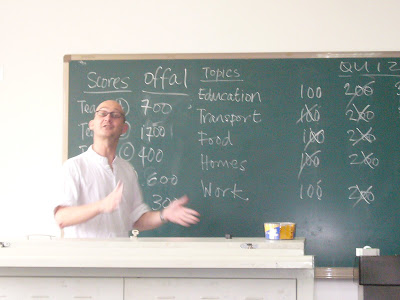On top of the world
And sometimes, by accident, everything just works out.
All I wanted from Yunnan last month was some peace and quiet and fresh air. Oh, and maybe a chance to escape the intense humidity that builds up under Chengdu’s hazy grey skies.
 The photo says it all really.
The photo says it all really.It was taken from my room at Tashi’s Lodge near Deqin right on the Yunnan-Tibet border. I’d not planned to go there at all but turned up having missed my bus back to Zhongdian and then stayed for four days either sat on this terrace reading a book in the sun or walking around Meili Snow Mountain.
The mountain is one of Rough Guide’s ‘Must see’ sights while in China – although you have to be extremely lucky to see it at its best during a cloudless sunrise. Still, even through the clouds that hung around it while I was there, you can see why it made the Rough Guide list.
.jpg) (By the way, it’s also home to the world’s most southerly glacier. I spent three hours climbing up the mountain alongside this rather sad piece of dirty ice which is disappearing fast because of the changing climate. My Tibetan guide wistfully pointed to the spot way down the valley where he remembered the glacier reaching when he was a kid. Ten more years and it’ll be virtually gone.)
(By the way, it’s also home to the world’s most southerly glacier. I spent three hours climbing up the mountain alongside this rather sad piece of dirty ice which is disappearing fast because of the changing climate. My Tibetan guide wistfully pointed to the spot way down the valley where he remembered the glacier reaching when he was a kid. Ten more years and it’ll be virtually gone.) Many of the most memorable bits of the holiday were kind of accidental. Just looking out of the window of the bus on the way to a new place often made you gasp. The towering mountains! The plunging valleys! Rocky roads scratched into sheer rock faces at nose-bleeding heights. And blue blue skies that lift your spirit like no drug or booze ever can.
Many of the most memorable bits of the holiday were kind of accidental. Just looking out of the window of the bus on the way to a new place often made you gasp. The towering mountains! The plunging valleys! Rocky roads scratched into sheer rock faces at nose-bleeding heights. And blue blue skies that lift your spirit like no drug or booze ever can.











